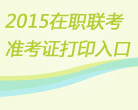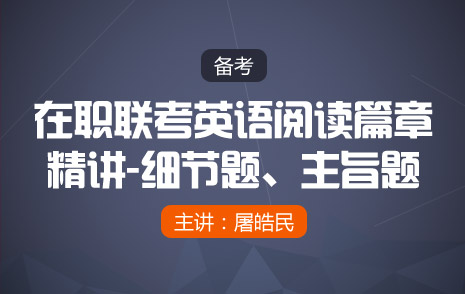2015-09-18 15:12:18 来源:网络发表评论
 在职联考准考证打印
在职联考准考证打印
备考辅导:英语备考策略和技巧 联考英语翻译备考策略 2015在职硕士考试经验技巧
GCT考试: GCT英语备考辅导 GCT数学备考辅导 GCT语文备考辅导 GCT逻辑备考
公共管理: 公文写作范文汇总 2015年在职MPA管理学案例材料 人力资源营销新论
艺术硕士: 艺术硕士艺术概论资料汇总 艺术硕士复习试题|答案 艺术硕士备考知识点
The exact number of English words is not known. The large dictionaries have over half a million entries, but many of these are compound words (schoolroom, sugar bowl) or different derivatives of the same word (rare—rarely, rarefy), and a good many are obsolete words to help us read older literature. Dictionaries do not attempt to cover completely words that we can draw on: the informal vocabulary, especially slang, localism, the terms of various occupations and professions; words use only occasionally by scientists and specialists in many fields; foreign words borrowed for use in English; or many new words or new senses of words that come into use every year and that may or may not be used long enough to warrant being included. It would be conservative to say that there are over a million English words that any of us might meet in our listening and reading and that we may draw on in our speaking and writing.
Professor Seashore concluded that first graders enter school with at least 2,000 words and add 5,000 each year so that they leave high school with at least 80,000. These figures are for recognition vocabulary, the words we understand when we read or hear them. Our active vocabulary, the words we use in speaking and writing, is considerably smaller.
You cannot always produce a word exactly when you want it. But consciously using the words you recognize in reading will help get them into your active vocabulary. Occasionally in your reading pay particular attention to these words, especially when the subject is one that you might well write or talk about. Underline or make a list of words that you feel a need for and look up the less familiar ones in a dictionary. And then before very long find a way to use some of them.
Once you know how they are pronounced and what they stand for, you can safely use them.
16. In the author’s estimation, there are ____ words in English.
A. more than half a million B. at least 24,000
C. at least 80,000 D. more than a million
17. The word “obsolete” most probably means ____.
A. no longer in use B. profoundC. colorful or amusing D. common
18. One’s recognition vocabulary is ____.
A. less often used than his active vocabularyB. smaller than his active vocabulary
C. as large as his active vocabularyD. much larger than his active vocabulary
19. The author does not suggest getting recognition vocabulary into active vocabulary by ____.
A. making a list of words you need and looking up the new ones in a dictionary
B. everyday spending half an hour study the dictionary
C. consciously using the words you recognize in reading
D. trying to use the words you recognize
20. From this passage we learn that ____.
A. dictionaries completely cover the words we can make use of
B. “schoolroom” is used in the passage as an example of a specialized term
C. once you know how a word is pronounced and what it represents, you have turned it into your active word
D. active vocabulary refers to words we understand when we read and hear them
16.【答案】D。
【解析】在第一段中明确写道:保守估计,在听说读写各方面可能会遇到的英语单词超过一百万个。从这一句我们可以看出D项“一百万多个”是正确的。A项不正确,而B项是指高中毕业生的词汇量,C项是指一年级学生的词汇量。
17.【答案】A。
【解析】对这一题我们可以通过上下文的意思来判断,文中写道obsolete words是用来帮助我们阅读古代文学的,由此我们可推断出,obsolete words是用于古代文学中的,即老式词,所以A项“不再使用的”与原文相近,B、C、D都不正确。
18.【答案】D。
【解析】在第二段末尾,明确提到recognition vocabulary(认识词汇)是用于读或听的词汇,active vocabulary(会用的词汇)是说和写时用的词汇,后者比前者小得多,即会用的词汇小于认识的词汇,这样不难看出D项是正确的,而A项“比会用的词汇用得少”,这在原文中未曾提及,B、C两项与原文意思不符。
19.【答案】B。
【解析】这一题要求我们对原文充分理解后,结合排除法来做。文中第三段讨论了这个问题,我们可以在其中发现A项:把你需要用的词列成一张单子,然后在字典中查出生词的涵义,C项:有意识地多用你在阅读中认识的新词,D项:尝试使用你认识的词。在排除以上三项之后只有B项,每天读半小时的字典符合题意。
20.【答案】C。
【解析】这一题要求对全文通篇有所理解后才能决定出答案,并且这种题无法从文中找到一个可用判断的确切依据,须用排除法结合大意来做。A项认为“字典完全包括我们所用的词汇”,而原文中提到字典并不企图完全包含我们所用的词汇”,因此A是不正确的。B项认为“schoolroom在本文中用于说明特定术语”,而文中提到schoolroom时是作为复合词的例证,因此B是不正确的。C项认为“一旦你知道一个词如何发音且代表什么,你就掌握了这一单词”,这与原文中的“一旦你知道一个词如何发音且代表着什么,你就能安全地运用它”的意思相符,所以C项是正确的。
本文选自新东方在线论坛。
本文关键字: gct英语
 已帮助8878人
已帮助8878人
| GCT | 【特训】2015年GCT英语全程专项特训班 | ¥980 | 免费试听 |
| 【特训】2015GCT语文全程专项特训班 | ¥400 | 免费试听 | |
| 【特训】2015年GCT数学全程专项特训班 | ¥680 | 免费试听 | |
| 【特训】2015年GCT逻辑全程专项特训班 | ¥400 | 免费试听 | |
| 联考英语 | 【提高】2015年联考英语技巧提高班 | ¥680 | 免费试听 |
| 【冲刺】2015年联考英语冲刺抢分班 | ¥680 | 免费试听 | |
| 法律硕士 | 【全程】2015法律硕士专业综合全程 | ¥880 | 免费试听 |
| 工商管理 | 写作专项零基础班数学专项逻辑专项 | ||
| 专项班 | 公共管理会计硕士教育硕士艺术硕士 | ||
版权及免责声明
1,"新东方在线"上的内容,包括文章、资料、资讯等, 本网注明"稿件来源:新东方在线"的,其版权 均为"新东方在线"或北京新东方迅程网络科技有限公司所有 ,任何公司、媒体、网站或个人未经授权不得转载、链接、转贴或以其他方式使用。已经得到 "新东方在线"许可 的媒体、网站,在使用时必须注明"稿件来源:新东方",违者本网站将依法追究责任。
2, "新东方在线" 未注明"稿件来源:新东方"的 文章、资料、资讯等 均为转载稿,本网站转载出于传递更多信息之目的,并不意味着赞同其观点或证实其内容的真实性。如其他媒体、网站或个人从本网站下载使用,必须保留本网站注明的"稿件来源",并自负版权等法律责任。如擅自篡改为 " 稿件来源:新东方 " ,本网站将依法追究其法律责任。
3,如本网转载稿涉及版权等问题,请作者见稿后在两周内与新东方在线联系。

 w
12分56秒
w
12分56秒